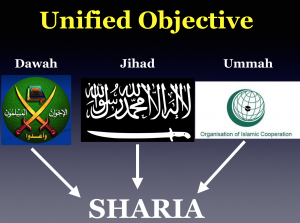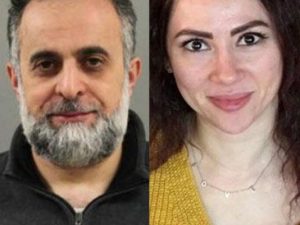YouTube Censors Geert Wilders
Why The Number of Jihadists in the West Continues to Grow
Connect The Dots – Was Las Vegas Shooter A Jihadist
Islamic Conquest of Sweden
The Quiet Islamic Conquest of Spain is Also Underway in America
Where Does a Muslim Soldiers Loyalty Lie
Muslim Who Killed Army Soldier in Arkansas Demands Halal Food in Prison
Al Qaeda’s Strength Grows Worldwide
Illogically Choosing Friends and Allies in This War
It is Way Past Time to Drop Pakistan as an Ally of the US
FGM on The Rise in America
Islam’s Allah is Definitely Greater Than God
Islam’s Allah is Definitely Greater than God
By Louis Palme
Ever since Muhammad’s surprise attack on the Jewish enclave at Khaybar in 629, Muslims have tried to strike fear in the hearts of non-Muslims by shouting “Allahu Akbar!” – Allah is Greater. The same shout of “Allahu Akbar” was used by the Islamic airplane hijackers on 9/11/01 and by Nidal Hasan at Fort Hood on 11/5/09.
For some reason, newscasters and journalists insist on insulting Allah by translating that exclamation merely as “God is great.” Such a depreciating distortion is — or should be — considered blasphemy by devout Muslims.
Allah Doesn’t Get Tired
We all know that God created the heaven and the earth in six days, and on the seventh day God rested. Jews and some Christians still consider the seventh day of the week a day of rest. Not only do they refrain from working, they won’t even distract from remembering God by doing such trivial things as cooking or switching lights on and off.
Allah also created the heavens and the earth in six days (Surah 7:54), but unlike God, Allah was not tired by all of that creation work. Surah 46:33 says, “Do they not see that Allah, who created the heavens and the earth and was not wearied by their creation, has power to raise the dead to life. Yes, he has power over all things.” There was no need for Allah to rest, and to this day Muslims do not set aside a day of rest to remember Allah’s feat of creation.
Allah Can Dispense Both Good and Evil
People often consider God to be all-powerful, but he is actually constrained in a very important way: He cannot do evil. James 1:13 says, “If a person is tempted by such trials, he must not say, ‘This temptation is from God.’ For God cannot be tempted by evil, and he himself tempts no one.” Even in the familiar Old Testament story of Job, it was Satan who tested Job’s faith by stripping him of all his blessings. Satan’s test failed.
On the other hand, Allah can inflict both good and evil on his subjects. Surah 4:78 says, “When they are blessed with good fortune, they say, ‘This is from Allah.’ But when evil befalls them, they say: “it was [Muhammad’s] fault.’ Say to them, ‘All is from Allah.’”
Allah Measures Out His Blessings to Keep His Subjects in Line
God is known for His unconditional love (hecedh) and the many blessings he bestows on those who believe in him. This is expressed in Ephesians 3:20 – “Now all glory to God, who is able, through his mighty power at work within us, to accomplish infinitely more than we might ask or think.” This generosity is also expressed in 2 Corinthians 9:8 – “And God is able to bless you abundantly, so that in all things at all times, having all that you need, you will abound in every good work.” Does this mean that all those who worship God are rich? No, but they are never wanting of blessings from God.
Meanwhile, since the beginning of Islam, people have noticed that Muslims in general are among the poorest and most oppressed faith group known to mankind. Allah has a reason for that, expressed in Surah 42:27, “Had Allah bestowed abundance upon His servants, they would have committed much injustice in the land. He gives them what He will in due measure; He knows and observes his servants.”
Allah Needs no Partner to Defend Him
Christians believe that God is revealed to mankind in three forms – God, His Son Jesus Christ — a human manifestation of God, and the Holy Spirit an omnipresent invisible God-force. A blessing by the Apostle Paul is expressed this way in 1 Corinthians 13:14: “May the grace of the Lord Jesus Christ, and the love of God, and the fellowship of the Holy Spirit be with you all.”
Of course, the idea of Allah having partners is unthinkable to Muslims. For God to have a “son” he would have had sex with consort (wife). (See Surah 6:101 and 72:3) Besides, He needs no assistance in His work. Surah 17:111 expresses it this way: “Say: ‘Praise be to Allah who has never begotten a son; who has no partner in His Kingdom, who needs none to defend him from humiliation.’”
Allah Should Never be Confused with the Judeo-Christian God
Arabic translations of the Bible often use “Allah” for God because it is a familiar term. However, compromising Allah’s reputation by using His name in place of the more limited god of Jews and Christians has become a point of aggravation for many devout Muslims. In 2009, Malaysia (which is 61% Muslim and 9% Christian) passed a law forbidding Christians from using “Allah” for the Judeo-Christian God. Muslims were afraid that using the same word Allah would make it easier for Christians to persuade Muslims to convert to Christianity. Islamic authorities went so far as to confiscate Bibles that contained the word Allah. Brunei went a step further and banned 19 religious terms from being used by non-Muslims.
Conclusion
So the next time you hear or see someone insulting Allah by referring to Him as God or translating “Allahu Akbar” as Allah being merely great and not greater, please help correct that gross error. We need to make sure Allah gets proper recognition for all he has done.
Michigan Teen Honor Kills His Mother For Becoming Too Westernized
Hamas-CAIR Tries To Shut Down Talk Educating Citizens
- « Previous Page
- 1
- …
- 85
- 86
- 87
- 88
- 89
- …
- 95
- Next Page »














